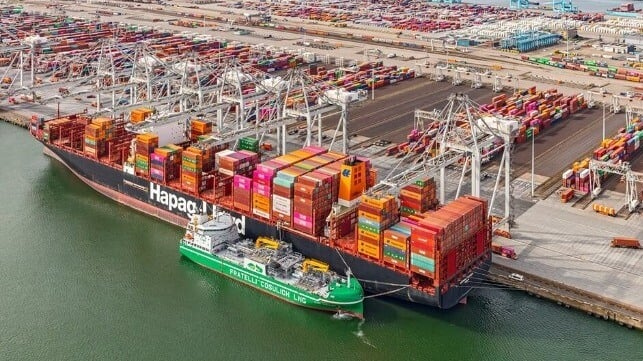Hapag-Lloyd Carries Out Largest Bio-LNG Bunkering Yet

Hapag-Lloyd has become the latest liner to try bio-LNG as a marine fuel. In the largest ship-to-ship bio-LNG bunkering operation yet, STX Group and Titan Clean Fuels supplied 2,200 tonnes of the alternative fuel for Hapag-Lloyd’s Brussels Express at Port of Rotterdam.
Bio-LNG used in the maritime industry is produced from biomass feedstocks like human or agricultural waste, which means it does not compete with the production of food, fiber, or fodder (like many traditional biofuels do). Bio-LNG can have net-zero or even net-negative GHG emissions on a lifecycle basis depending on the method of production, according to Titan.
Built by Hyundai Heavy Industries in 2014, the Brussels Express became the first large container ship in the world to be converted to LNG propulsion in September 2020. The retrofit, carried out at the Huarun Dadong Dockyard in Shanghai, cost $35 million.
Bunkering of bio-LNG on Brussels Express is part of Hapag-Lloyd’s plan to offer climate-friendly transport services. The line plans to go fully carbon neutral by 2045, and it says that it is on its way. The company reduced the GHG emissions of its fleet by 0.8 million tons in 2023 compared to the previous year, thanks in part to a significant increase in the amount of bunkered biofuel blend (over 200,000 tons).

that matters most
Get the latest maritime news delivered to your inbox daily.
Jan Christensen, Hapag-Lloyd Senior Director Fuel Purchasing, said that although bunkering large quantities of bio-LNG is possible and scalable, there is still more progress required regarding the necessary infrastructure and the regulations.
Titan is currently building the world’s largest bio-LNG plant at the port of Amsterdam, which will have a capacity to produce 200,000 tons annually when completed. The independent supplier recently chartered Alice Cosulich, increasing its bunkering fleet to three.
